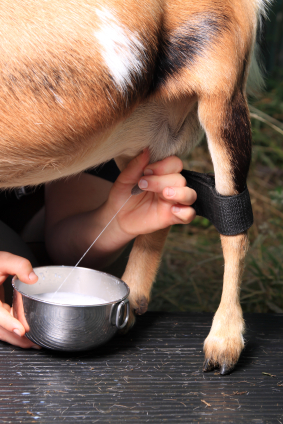Do you know Milk production is the major backbone for most mammalian animals and they are still some of the important reasons why people kept them commercially especially in high quantity and good condition.
Cow used for Dairy are common and most people take the milk and yoghurt gotten from cow but do you know that goat are also good diary animals?
Do you know Goat performs really great at diary production? It is my Joy to also make it known that Nigeria Dwarf Goat,is the big deal when we are talking of improving milk production in diary farming "goats" Nigeria Dwarf Goats as gotten what it takes to produce more than enough needed milk during lactation.
I know you might be wondering why is it the Nigeria Dwarf Goat again?
Don't worry i have got you covered with answers to your questions;
There are 5 Major Reasons why you should Choose Nigeria Dwarf Goat for Milk Production
check them out below;
1) Better For You
Goat milk is easier for human’s to digest than cow’s milk. It’s naturally homogenized, with smaller fat particles evenly suspended throughout the milk. It contains vitamins, minerals, trace elements, electrolytes, enzymes, and proteins that are easier for humans to assimilate than similar content in cow’s milk. For these reasons, it’s typically digested in 20 minutes; whereas it can take 24 hours for humans to digest cow’s milk.
People who suffer from lactose intolerance may find that goat’s milk is a good alternative.
Goat milk contains less lactose than cow milk and since it passes through the digestive system so rapidly, many who suffer from lactose intolerance have no difficulty with goat milk.
Goat milk doesn’t contain the complex protein compounds that stimulate allergic reactions to milk.
People experiencing bloating, diarrhea, asthma, and irritability after consuming milk are usually suffering an allergic reaction to cow milk caused by these complex proteins. Goat milk; however, can typically be consumed without triggering these reactions.
Because goat milk soothes the digestive tract, is typically accepted by those with lactose intolerance, and doesn’t trigger milk allergies; it’s often recommended for infant nutrition and treatment of coronary diseases, cystic fibrosis, Crohn’s disease, intestinal disorders, gallstone problems, and many others.
2) It Tastes Better
Among the dairy breeds, Nigerian Dwarf goat milk has the highest levels of butterfat, making it so creamy that it’s often preferred over cow’s milk.
Nigerian Dwarf milk has approximately 6 – 10% butterfat, as opposed to approximately 2 – 6% for other breeds. Since butterfat is what gives milk its sweet flavor, it’s the sweetest, richest milk of all the dairy breeds.
3) Year Round Availability
Most dairy goat breeds can only be bred seasonally in the fall; which leads to a glut of milk in the spring after kidding has occurred, but milk shortages in later seasons after the does dry up. Nigerian Dwarfs can be bred in any season; however, so kidding can be staggered to assure a constant supply of milk.
4) Smaller Packaging

Nigerian Dwarfs are only about 20” tall and typically weigh less than 75 pounds, making them much easier to handle and house than the large dairy goat breeds.
They’re similar in size to a medium size dog, and are fine-boned, proportionately small dairy goats (not the stockier Pygmy goats).
Given their small size, two can live in about 20 sq. ft. of space (if they have outside pasture space), making them feasible in both rural and suburban environments.
Some cities have even begun to allow Nigerian Dwarf goat does.
Because of their small size, even small women and children can easily milk and handle Nigerian dwarfs. And most people handling livestock would rather have their foot stepped on by a 75 pound goat rather than a several hundred pound goat (and it will happen).
5) More Cost Effective
Good quality, registered Nigerian Dwarfs can typically be purchased from breeders for around $500 per goat, whereas the larger dairy breeds are typically twice as much (or more). It’s therefore less expensive to start with a few Nigerian Dwarfs than other breeds. Nigerians are also notoriously prolific, usually producing between 2 – 5 kids each freshening, so a milking herd (of whatever size desired) can be built in a very short time.
Nigerian Dwarfs are also more affordable to maintain.
From an efficiency standpoint, goats convert their food into milk more efficiently than cows; and among the dairy goat types, Nigerian Dwarfs convert their food more efficiently than any other dairy breed.
And goats like to browse rather than graze so a traditional pasture isn't required like it is for cows.
They can be turned loose in “wooded” pasture areas where they’ll help control poison ivy, blackberries, multi-flora rose, etc. – all those things we tend to consider nasty weeds, they think are tasty.
The Total Package
As with anything, it’s important that the milk from Nigerian Dwarfs be handled properly and that the goats are properly cared for; however, it’s popularity is on the rise because it’s so nutritious, healthy, delicious, convenient (relatively speaking), and cost effective.
For those interested in producing or obtaining the highest quality milk, the Nigerian Dwarf goat is increasingly the answer.


Hello Bro Mat, Nice post you've got here, Keep the Good work going
ReplyDeleteHello boss, i feel good to have you here and how is your farm? Thanks for reading our updates today, i wish you success in your farming activities.
Delete